A TRIBUTE TO MOSES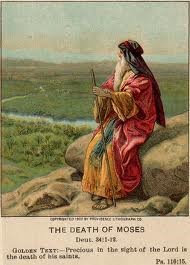
This last chapter in Deuteronomy is written by the hand of another.
As predicted, Moses, at the age of 120, climbed Mt. Nebo and died there, in the land of Moab, having seen the Promised Land, but not permitted to enter it apart from Jesus. We don’t see him again until he appears more than a thousand years later, with Jesus, on the Mount of Transfiguration. He is in Promised Land by the work of another.
The grace of the Lord was with him, having sustained him during his remarkable life: “Although Moses was one hundred and twenty years old when he died, his eye was not dim, nor his vigor abated.” (Deut. 34:7)
The Book of Deuteronomy closes with a fitting tribute to this servant of God, whom the people of Israel will mourn for thirty days.
Deut. 34:10-12 Since then no prophet has risen in Israel like Moses, whom the Lord knew face to face, [11] for all the signs and wonders which the Lord sent him to perform in the land of Egypt against Pharaoh, all his servants, and all his land, [12] and for all the mighty power and for all the great terror which Moses performed in the sight of all Israel.
These words held true during the days of the one who wrote them. They would hold true until the coming of the One whom Moses predicted:
Deut. 18:15 “The Lord your God will raise up for you a prophet like me from among you, from your countrymen, you shall listen to him.
Matthew 17:5 5 While he was still speaking, a bright cloud overshadowed them, and behold, a voice out of the cloud said, “This is My beloved Son, with whom I am well-pleased; listen to Him!”
Hebrews 3:3 (NIV) 3 Jesus has been found worthy of greater honor than Moses, just as the builder of a house has greater honor than the house itself.
Jesus (Yeshua) shares the name derived Moses’ successor-Yoshua, Yeshua. “God to the rescue; our salvation”.
THE FOCUS NOW SHIFTS TO JOSHUA
Joshua is publicly commissioned in Numbers 27:23 as the new leader of the nation, filled with the spirit of wisdom (Deut 34:9). The people pledge to give him their obedience (Joshua 1:16-18).
THE BOOK OF JOSHUA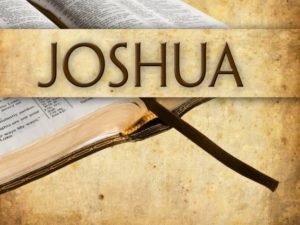
Joshua 1:1-2 Now it came about after the death of Moses the servant of the Lord that the Lord spoke to Joshua the son of Nun, Moses’ servant, saying, [2] “Moses My servant is dead; now therefore arise, cross this Jordan, you and all this people, to the land which I am giving to them, to the sons of Israel.
John Wesley once wrote, “God buries His workmen, but carries on His work.”
The good news is that the Lord speaks to Joshua, reassuring him with many promises, the most important being the promise of His presence.
Joshua 1:5 There shall not any man be able to stand before thee all the days of thy life: as I was with Moses, so I will be with thee: I will not fail thee, nor forsake thee.
We are given a similar promise that should put our hearts at rest: “for He has said, ‘I will never leave you or forsake you’” (Hebrews 13:5b).
The work Moses had done was essential preparation for the work that Joshua would do. The Law that came by Moses brings the knowledge of sin and our need for the atonement for our sin. What the Law could not do, in that it was weak through the flesh, God, our Greater Joshua does.
In Joshua 3, Joshua does what Moses could not do- he enters the Promised Land.
Each workman takes up a work, grateful for those who have pioneered the way. When our work is finished, there will be more work to do.
The Book of Joshua is concerned with the work of Canaan’s Conquest (Chapters 1-12) and its settlement (Chapters 13- 24). We see Joshua as the leader in warfare and government.
The Book of Joshua anticipates the New Testament Book of Ephesians. Joshua leads the redeemed people of God to possess their possessions, taking their allotted inheritance in Canaan. In the Book of Ephesians, the believer is called to lay hold of their inheritance in Christ. They too will be instructed in spiritual warfare and government. They will be exhorted to walk worthy of their calling and fight the good fight of faith.
The Book of Joshua covers a period of approximately 50 years.
The God of the Old Testament is the same as the God of the New Testament. It may be hard for us to grasp, but it is true, nonetheless. The Lord Jesus, the Prince of Peace, who came to make peace, reconciling us to God by the sacrifice of Himself on the cross, giving us His personal peace, and establishing His rule in our hearts by the gift of the indwelling Holy Spirit, is a God of war (Exodus 15:3).
Psalm 24:8
Who is the King of glory?
The Lord strong and mighty,
The Lord mighty in battle.
Rev. 19:11-21 [11] And I saw heaven opened; and behold, a white horse, and He who sat upon it is called Faithful and True; and in righteousness He judges and wages war. [12] And His eyes are a flame of fire, and upon His head are many diadems; and He has a name written upon Him which no one knows except Himself. [13] And He is clothed with a robe dipped in blood; and His name is called The Word of God. [14] And the armies which are in heaven, clothed in fine linen, white and clean, were following Him on white horses. [15] And from His mouth comes a sharp sword, so that with it He may smite the nations; and He will rule them with a rod of iron; and He treads the wine press of the fierce wrath of God, the Almighty. [16] And on His robe and on His thigh He has a name written, “KING OF KINGS, AND LORD OF LORDS.”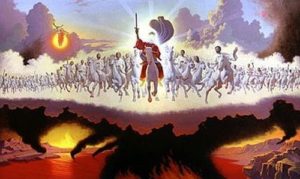
It is sometimes hard for people to apprehend this attribute of Jesus.
“In righteousness He judges and wages war.”
We are blinded by our own sin, failing to see that our sin incurs God’s anger.
Jesus said this:
“He who believes in the Son has eternal life; but he who does not obey the Son shall not see life, but the wrath of God abides on him.” (John 3:36)
Paul tells us that we are born spiritually dead, and subject to the spirit that works in the sons of disobedience and WERE BY NATURE “CHILDREN OF WRATH” (Eph 2:1-3).
God is at war with sin. In righteousness He judges sin at the cross of Christ. It is only when we meet the Lord there, that His wrath can be turned away, His warfare accomplished, and we can find peace.
Jesus came to give us peace, but at the cost of His life blood. He destroyed the work of the devil and secured victory over the enemy of death.
He calls us to stand in what He has won for us. The battle is the Lord’s.
Ephes. 6:10 Finally, be strong in the Lord, and in the strength of His might. [11] Put on the full armor of God, that you may be able to stand firm against the schemes of the devil. [12] For our struggle is not against flesh and blood, but against the rulers, against the powers, against the world forces of this darkness, against the spiritual forces of wickedness in the heavenly places.
If God is not a God of war, He cannot be a God of love. It is His eternal undying love that provokes Him to make war against all that would prevent His own from being restored to their true inheritance in Him.
So the Lord commissions His warrior Joshua repeating the admonition: “Be strong and (very) courageous.” (Joshua 1:6,7,9). His uncompromising obedience to the Law, and trust in God’s ability to fulfill His promise, would be the key to his success.
Joshua 1:8 8 “This book of the law shall not depart from your mouth, but you shall meditate on it day and night, so that you may be careful to do according to all that is written in it; for then you will make your way prosperous, and then you will have success.
This reminds us of the Lord Jesus, the Greater Joshua, who offered perfect obedience to God, successfully accomplishing our redemption.
Hebrews 10:7 7 “THEN I SAID, ‘BEHOLD, I HAVE COME (IN THE SCROLL OF THE BOOK IT IS WRITTEN OF ME) TO DO YOUR WILL, O GOD.'”
RAHAB- WHEN YOUR LIFE HANGS BY A THREAD (JOSHUA 2)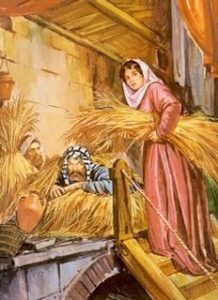
Jericho was the first city to be taken. It is thought to have been a military garrison. It guarded three intersecting travel routes from the Jordan Valley to population centers in the hill country- Jerusalem, Bethel and Orpah. Israel’s war was directed toward government and military installments. Jericho was a small settlement with probably 100 soldiers. This is why all Israel could circle it seven times and then attack it in the same day.
Jericho represents the first fruit of victory. Everything in Jericho was to be devoted to judgment. Jericho represents the self-life of the human soul. It is under the ban of the cross. We must be willing to let all that is of the old life in Adam go. If we attempt to save it, we will lose it. If we lose it, surrender it to the cross, we shall find our true life in Christ.
The spies go into this Canaanite military stronghold. (There is no archeological evidence that Jericho or Ai has civilian populations.) They stay at what may have been the only inn. The author of the book “Jericho and Ai”, Richard Hess, believes that Rahab, a female inn keeper, and her household, were the only non-combatants in Jericho, p.38-39). Rahab hides the spies and protects them from the agents of Jericho’s king. She confesses faith in the God of Israel:
“for the Lord your God, he is God in heaven above, and in earth beneath.” (Josh 2:11)
The testimony of the greatness of their God had caused fear to come upon the people of Jericho.
The two spies in Jericho have a similar task to the Word and the Spirit in the conversion of the human soul.
Rahab, once she receives the spies, pleads for her household’s salvation from the judgment that is due to come upon her city. The spies agree to save her if a cord of scarlet thread is hung from her window. Rahab responds with the obedience of faith.
Four things are said about the cord: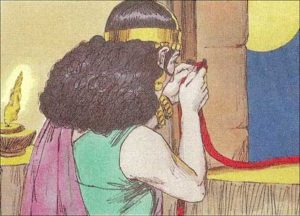
- It was scarlet in color.
This reminds us of sin (Isaiah 1:18- though your sins be like scarlet- obvious and recognizable, such as in Rahab’s trade). Sin must be acknowledged.
Scarlet also reminds us of the blood of the atoning sacrifice. Scarlet points towards the greater salvation provided by the sinless life of Jesus Christ offered as the atoning sacrifice for our sins (1 John 2:2)
Leviticus 17:11 (NASB) 11 ~’For the life of the flesh is in the blood, and I have given it to you on the altar to make atonement for your souls; for it is the blood by reason of the life that makes atonement.’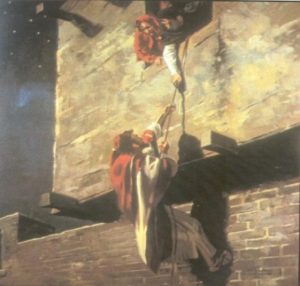
The spies bound themselves to the promise that those who stayed in the house that had the mark of scarlet were to be safe from harm, as were firstborn sons when the angel of death passed over on that fateful day in Egypt (Exodus 12:13). Otherwise they themselves would take upon themselves the guilt of their shed blood.
- It was made of thread (chut) (Joshua 2:18).
Rahab had let the spies down from her window by “a rope” (Chebel) as the means of their escape from Jericho. This scarlet thread was not something that would be considered as a sufficient means of escape to the natural mind. The natural mind understands nothing of the things of God, and does not regard the blood of Christ as a sufficient means for our salvation.
- It was a cord (tiqvah, 2:18).
That cord would be the object of her faith. It represents the saving work of Christ. Cords had been the means of deliverance to others (Jer. 38:6,11) including the spies (2:15). Rahab was to trust the cord as the spies had trusted the ability of the rope as a means of deliverance.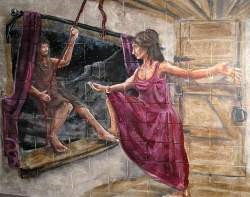
- It was to be placed in the window. The cord was to be displayed for the purpose of identification. The cord would be visible to the spies on the outside. It was a sign of the covenant commitment they had made.
NEW TESTAMENT READING: LUKE 13:22-14:6
Jesus answers the question “Will those who are saved be few?” with a reminder that without faith it is impossible to please Him.
Luke 13:24 24 “Strive to enter through the narrow door; for many, I tell you, will seek to enter and will not be able.
He answers the same question in Matthew 7:14
Matthew 7:14 14 “For the gate is small and the way is narrow that leads to life, and there are few who find it.
The gospel demands a response. Strive to enter the gate. This refers to the need for repentance- recognizing that you are a sinner, turning from your life of sin and casting yourself upon Jesus, trusting Him as Savior and submitting to Him as Lord. Luke 13:24 does not teach salvation by works. The striving work called for here is believing the gospel.
John 6:29 29 “This is the work of God, that you believe in Him whom He has sent.”
What do we need to do to go to hell? Nothing. Just stay on the road you were born on, walking according to the course of this world (Eph 2:2).
Matthew 7:13b for the gate is wide and the way is broad that leads to destruction, and there are many who enter through it.
What do we need to do to be saved? “Let the wicked forsake his way and the unrighteous man his thoughts” (Isaiah 55:7). The Greek word for repentance is ‘metanoia’, meaning, ‘change your way of thinking’. You cannot save yourself. You are a sinner who needs a Savior. And there is only One Savior who can save us from God’s wrath against sin- Jesus, who made a perfect atonement for those who will believe on Him. There is a difference between believing in something and believing ‘on’. Believing on means that you are personally casting the full weight of your trust upon Him. It is believing that Jesus died for your sins, and that He paid your debt, and you are trusting Him and His finished work on the cross exclusively for your right standing before God in the Day of Judgment.
Jesus then gives the explanation that many people presume a saving relationship with Him, just because they heard of Him, saw him, attended meetings, and even dinners with Him. But they never came to Him FROM A PLACE OF RECOGNIZING THEIR SIN AND THEIR NEED TO TRUST HIM AS LORD AND SAVIOR.
Luke 13:25-27 25 “Once the head of the house gets up and shuts the door, and you begin to stand outside and knock on the door, saying, ‘Lord, open up to us!’ then He will answer and say to you, ‘I do not know where you are from.’ 26 “Then you will begin to say, ‘We ate and drank in Your presence, and You taught in our streets’; 27 and He will say, ‘I tell you, I do not know where you are from; DEPART FROM ME, ALL YOU EVILDOERS.’
Jesus was letting them know that unless you believe that He is Who He says He is, the one and only sin-bearing substitute, you are still in your sins.
There were those who recognized the likelihood of Jesus being killed in Jerusalem and they tried to deter him from going there. Jesus resolutely stays on mission. He expresses His compassionate desire that the people of Jerusalem, who had a history of killing its prophets, would turn from their sin, but acknowledges that they were not willing to repent and trust Him as their Messiah.
This again clarifies that there are two aspects to God’s will- His will of desire- “How often would I have gathered you”, and His will of decree- “And you were not willing” (Luke 13:34).
The early Christians in Jerusalem recognized how God used the people’s rejection of Christ for His purpose.
Acts 4:27-28 27 “For truly in this city there were gathered together against Your holy servant Jesus, whom You anointed, both Herod and Pontius Pilate, along with the Gentiles and the peoples of Israel, 28 to do whatever Your hand and Your purpose predestined to occur.
Jesus then exposes the hypocrisy of the religious leaders who criticized him for healing a man of dropsy, abnormal swelling of his body. He recognizes that they would rescue their animal on the Sabbath, if necessary, yet would let one of their own countrymen suffer, in order to safeguard their self-righteous Sabbath-keeping.
TODAY’S READING IN THE BOOK OF PSALMS: PSALM 79
The Psalmist is feeling the defeat suffered by Jerusalem as it is overtaken by enemies. He feels the reproach, scorn and derision heaped upon God’s people by neighboring countries (v.1-4).
There is a cry for vindication that we often hear in the Bible. “How long before you take action, before you turn the tables on our enemies?”
There is the call for forgiveness and an appeal to God’s mercies (Ps. 79:8).
The pivotal moment comes when one recognizes their real need and true desperation.
Psalm 79:8 8 Do not remember the iniquities of our forefathers against us; Let Your compassion come quickly to meet us, for we are brought very low.
The Psalmist recognizes that as those identified with the One True God that His reproaches would fall on them also.
The result is praise. From generation to generation.
TODAY’S PROVERB- Proverb 12:36
Proverbs 12:26 26 The righteous is a guide to his neighbor, But the way of the wicked leads them astray.
People keep an eye on those who call themselves Christians. What kind of Christian are you? What kind of neighbor are you? Are you a signpost to Jesus?
PRAYER: Father, we thank You again for Your mercies. How merciful it is to know that we can cast the full weight of our trust upon Your one-and-only plan of salvation, relying completely on the merits of Your Son. In Him we have the forgiveness of our sins and a revelation of Your compassion. May this day be full of praises coming from our lips. In Jesus’ Name. Amen.
Pastor David
